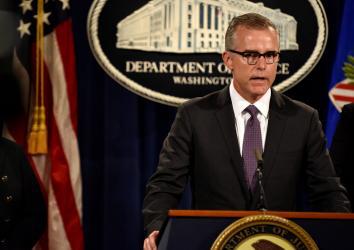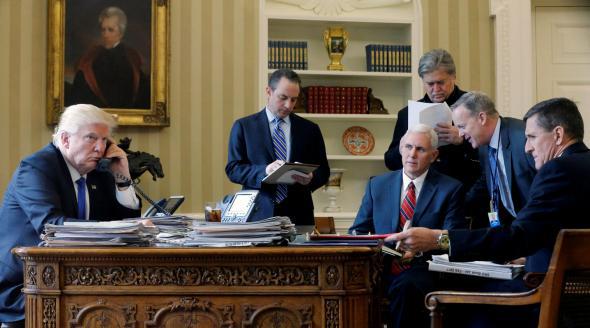Each day brings more signs that President Trump has no regard for democratic norms, no understanding of how government works, and no interest in repairing these deficiencies.
The latest signs flashed Thursday night, when CNN reported two acts of stunning malfeasance. In the first, a senior White House official—later identified as chief of staff Reince Priebus—asked the deputy director of the FBI to tell reporters that news stories about connections between Trump and Russia were overblown. (The FBI official, who is in the middle of investigating these connections, declined.)
In the second, Trump ordered the departments of Justice and Homeland Security to help make a case for his travel ban on people from seven countries, specifically by providing evidence that once they cross our borders these people commit crimes and engage in terrorism. Officials in those departments, who haven’t found such evidence, viewed the order as an attempt to distort or falsify intelligence for political purposes.

James Lawler Duggan/Reuters
Priebus’ chat with the FBI violates long-established rules barring political officials from contacting the bureau in any way about ongoing investigations. Trump’s prodding of the Justice and Homeland Security departments is reminiscent of the early Bush years, when Vice President Dick Cheney pressured the CIA to find evidence of a link between al-Qaida and Saddam Hussein, in order to justify the impending invasion of Iraq. No link was found; the invasion plowed forth anyway.
What these incidents have in common with many others in the five weeks since Trump took office is not just an impulse to spin reality so it suits his interests and desires (many presidents have been guilty of that, to some degree) but, more, a compulsion to blot out all interests and desires that are not his own. In his acceptance speech at the Republican National Convention, Trump proclaimed, “I am your voice.” Having won the election, a fact that he touts in every public setting as if it legitimizes all of his actions, he now seems to be declaring, “I am the state.”
After federal judge James Robart overturned his executive order banning visas for thousands of foreign visitors and immigrants, Trump tweeted, “The opinion of this so-called judge, which essentially takes law-enforcement away from our country, is ridiculous and will be overturned!” Leaving aside its widely noted absurdities there’s the more ominous danger of the tweet’s premise—that the proper role of judges (so-called or otherwise) is not to enforce the law as they interpret it but merely to enforce a president’s order. This judge’s opinion steals law enforcement away from “our country,” and “our country” is Trump (“I speak for you”—L’état, c’est moi).
On the same day, Trump also tweeted, “What is our country coming to when a judge can halt a Homeland Security travel ban and anyone, even with bad intentions, can come into U.S.?” Again, leaving aside the inaccuracies (it is not the case that just “anyone” can enter U.S. territory), the telling bit was the fact of his wondering what our country has come to when a judge can halt a president’s order. The answer, of course, is that our country had come to what it had been all along, or at least since 1803—a country where the judicial branch settles matters of constitutional law. Is Trump ignorant about this arrangement? Or does he want to undermine and destroy it?
Like many moguls, Trump has long believed that government should behave more like business. This notion has many fallacies, among them the fact that most businesses have one interest—to maximize profits—while governments, especially democratic governments, have to mediate many interests, some of them competing and contradictory. But most of the business people who recite this canard at least own businesses that report to stockholders and directors. By contrast, the Trump Organization—the only business he’s ever known—is privately owned and operated; it’s a family affair, beholden to no outsider.
And so, at least out of habit if not malice, this is the way Trump is trying to run the presidency: everything from the top—because the top is the only place that matters.
Many presidents had a tendency to concentrate power, but Trump has gone several leagues further. On Feb. 9, I wrote a column noting that Trump had not yet nominated any deputy, under, or assistant secretaries for the departments of State and Defense. Fifteen days later, nothing has changed. At the time, I took the vacant posts as signs of Trump’s incompetence or inexperience. But now I’m wondering if it might be deliberate, if he might not want to staff these departments.
During the campaign, Trump talked of “draining the swamp.” On Thursday, his chief strategist, Stephen Bannon, told the Conservative Political Action Conference that the Trump presidency’s goal is the “deconstruction of the administrative state.” He defined this target as the system of taxes, regulations, and international trade pacts, which he blamed for hampering economic growth and gnawing away at a culture of American nationalism. Maybe he and Trump see the vast bureaucracies of the Pentagon and the foreign service as another part of this coastal, cosmopolitan elite—the swamp to be drained.
Or it could be that Bannon’s view simply converges with the instincts of the owner of the Trump Organization to see all other power centers within the government—the departments that created and thrive on the taxes, regulations, trade pacts, and alliances—as adversaries or obstacles to Trump’s (and therefore the people’s) ambitions and interests.
But Trump is playing a dangerous game here, not only for the public’s interests and security but also for his own. A president can’t wipe out whole bureaucracies by simply neglecting them. He might even find—not too late, let’s hope—that he needs them. Should a crisis erupt in, say, the South China Sea—a region where his secretary of state, secretary of defense, and national security adviser have almost no experience or expertise—it would be good to have an undersecretary of defense for policy, an undersecretary of state for political-military affairs, and assistant secretaries for East Asian affairs in both departments. Even if there is no crisis, it is very useful for a global power to have such officials simply to call their counterparts in the region, see what’s going on, correct misunderstandings—in short, to maintain the alliance. (The State and Defense departments have acting secretaries in those posts, but most of them are junior holdovers from the Obama administration, or from the foreign or civil service, with no credible authority to speak on behalf of the sitting president.)
In any case, many of these bureaucracies rumble along, whether or not the president ignores them. They persist nonetheless. This is especially true of the law-enforcement and intelligence agencies, which keep gathering information about enemies, foreign and domestic. These rumblings—these eternal investigations—account for some of Trump’s discomfort at the moment, and his awkward attempts to overcome his troubles only make matters worse. Attacks on the permanent bureaucracy (which encompasses much more than the stereotyped “deep state”) only intensify the resentment and enmity of its denizens. They also rally officials who may not be whistleblowers by nature but now take up the cause, whether to protect the provincial interests of their agency or the broader interests of the country.
Friday afternoon, White House press secretary Sean Spicer (no doubt, at the instigation of Trump, who pays fanatical attention to such matters) banned reporters for the New York Times, Politico, and CNN from the daily press briefing. These reporters have written some of the most trenchant pieces on malfeasances and corruption at the White House. The president and his flacks may think they’ve dealt a blow to their enemies or, as Trump recently described them, the “enemies of the American people,” which in his mind are synonymous. But this is yet another figment of his isolation and self-centeredness. The government is a big place. Banning some reporters from the West Wing won’t dry up their sources or end the atmosphere of crisis, which is almost entirely of Trump’s own making.
